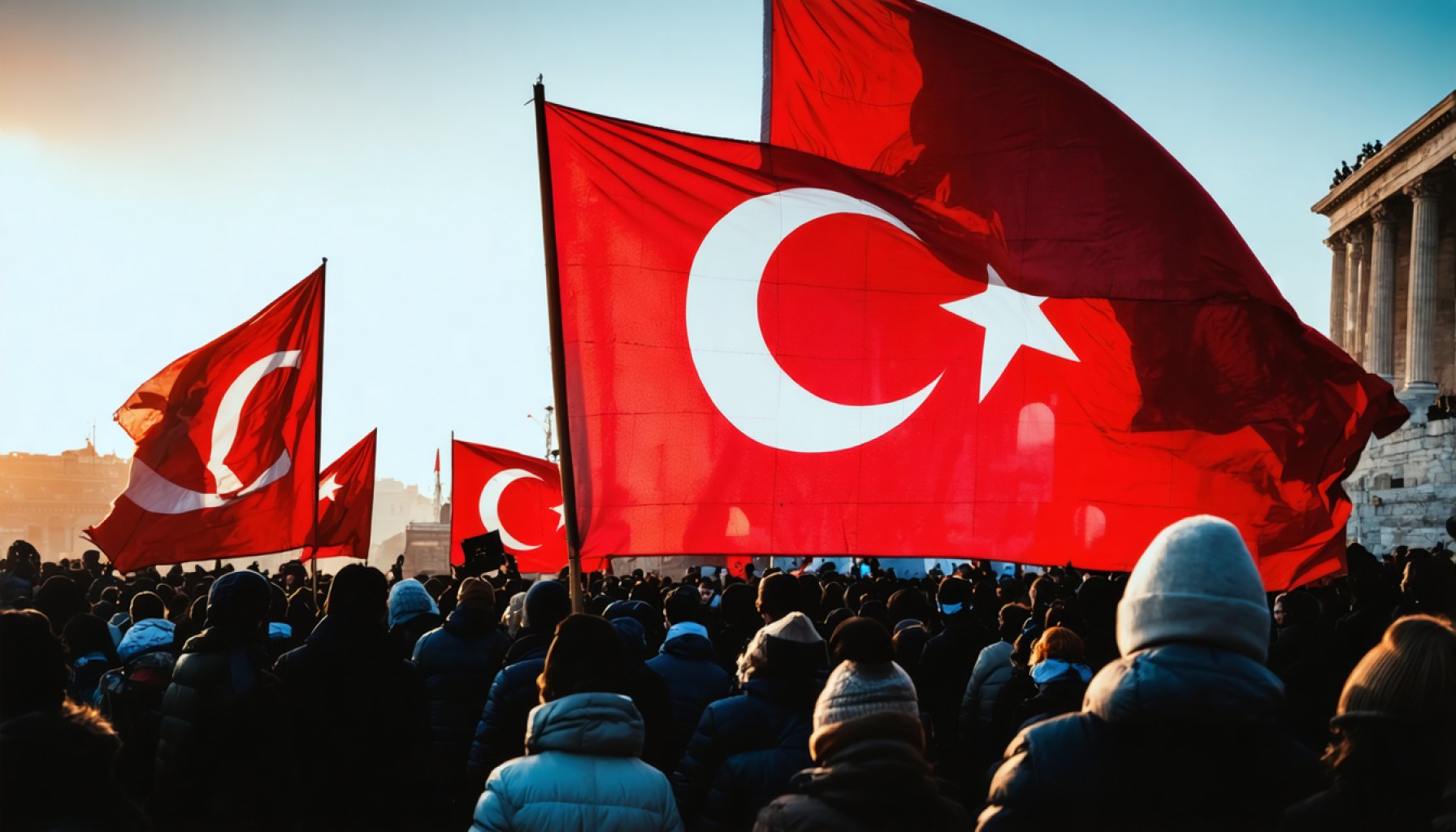- Citizens protest the arrest of Istanbul’s Mayor Ekrem İmamoğlu, showing strong resistance against governmental crackdowns.
- The Turkish government is intensifying measures against demonstrators, with investigations launched against 53 individuals involved in protests.
- Authorities report injuries among 16 police officers due to protests, indicating high tensions between law enforcement and demonstrators.
- On social media, 326 individuals are identified for allegedly inciting illegal acts, with 54 detained, showcasing the digital landscape’s role in dissent.
- After a 42-hour restriction, Istanbul residents regain access to platforms like X, YouTube, and TikTok, highlighting ongoing digital freedom struggles.
- This movement reflects Turkey’s dynamic political changes, with global attention on citizens’ resilience and their fight for justice and freedom.
The streets of Turkey pulse with unrest as citizens rally against the arrest of Istanbul’s Mayor, Ekrem İmamoğlu, defying bans and braving the watchful eyes of the authorities. The image of torrents of people gathering in resolute defiance paints a scene of a nation unwilling to be silenced. Amidst this cacophony, the government stands firm, issuing stern warnings about the consequences of street protests.
From the digital realm to the public squares, the tension escalates. The Turkish government ramps up its scrutiny, with Interior Minister Ali Yerlikaya announcing that investigations have been launched against 53 individuals linked to the demonstrations. In the process, 16 police officers reported injuries, highlighting the tangible friction between protesters and law enforcement.
Social media, the nerve center of modern dissent, becomes a battlefield. Authorities, keen on curbing incendiary online activities, have identified 326 individuals accused of “inciting illegal acts,” though only 54 have been apprehended so far. This crackdown extends its reach beyond borders, as some suspects reside abroad, making this a global tableau of protest and suppression.
Yet, amidst tightened controls, signs of digital freedom slowly emerge. After 42 hours of restricted access, Istanbul residents once again have free reign over platforms like X, YouTube, and TikTok, as reported by cyber-rights activist Yaman Akdeniz. This reprieve presents a brief opening in a climate where communication lines have been strategically stifled.
In the face of governmental might and social media strangulation, the key takeaway resonates clearly: the resilience of a populace unites with the power of digital platforms to challenge oppression. The continued demonstrations signal a critical narrative in Turkey’s evolving political landscape, echoing the voice of people determined to reclaim their agency. As eyes around the globe watch, the unfolding events echo a deeper question about authority, power, and the indomitable human spirit in the quest for justice and freedom.
Turkey’s Turmoil: Uncovering the Layers of Unrest and Digital Resistance
The Context of Turmoil: Turkey’s Political Instability
Turkey is no stranger to political unrest, and the recent protests following the arrest of Istanbul’s Mayor, Ekrem İmamoğlu, have added another chapter to its turbulent history. This civic unrest reflects deeper issues within the country’s political scene and its ongoing struggle with democracy, which has long been characterized by power struggles between secular and more conservative religious factions.
How-To Handle Protests Safely
1. Stay Informed: Follow reputable news sources for updates. Recommended sources include BBC News and Al Jazeera.
2. Use Encrypted Communication: Apps like Signal provide secure communication in sensitive times.
3. Stay Safe: Avoid confrontations, and wear appropriate gear.
4. Document Events: Use smartphone cameras to capture events while maintaining personal safety.
Real-World Use Cases of Social Media in Protests
Social media platforms like X (formerly Twitter), Facebook, and TikTok have played crucial roles in organizing and broadcasting protests globally. In Turkey, these platforms offer a vital channel to bypass traditional media limitations. The phenomenon isn’t unique to Turkey; similar patterns have been observed in protests in Hong Kong and during the Arab Spring.
Reviews & Comparisons of Social Media Platforms
– X (Twitter): Known for real-time updates and hashtags to consolidate movements.
– Facebook: Effective for organizing events and creating private discussion groups.
– TikTok: Provides visual storytelling through short videos, engaging a younger audience.
Insights & Predictions for Turkey’s Political Climate
Experts suggest that the ongoing protests could lead to further polarization within Turkey. The government’s aggressive stance could backfire, as history indicates that suppression often fuels greater dissent. With upcoming elections, political analysts speculate that the fallout from these events may significantly influence voter sentiment.
Security & Sustainability of Digital Activism
Maintaining secure online communication is vital for activists. Utilizing VPNs and encrypted messaging apps can protect identities and circumvent censorship. However, activists must also weigh the environmental impact of digital activism, primarily through the carbon footprint of data centers.
Pros & Cons Overview of Social Media in Protests
Pros:
– Immediate communication
– Broad audience reach
– Mobilization of international support
Cons:
– Risk of misinformation
– Potential legal repercussions
– Government surveillance
Recommendations for International Observers
1. Follow Reputable Journalists: Keep updated through credible sources.
2. Support Digital Rights: Advocate for freedom of speech and internet access.
3. Encourage Dialogue: Support diplomatic efforts to open channels between the Turkish government and its opposition.
Turkey’s protests underscore the power of collective action and digital platforms in confronting governmental authority. As seen before, the resilience of people coupled with technology serves as a formidable tool against oppression.
For more insights into global affairs, visit BBC and Al Jazeera.
